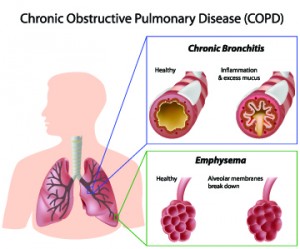-

TUESDAY Q & A: Healthy lifestyle choices, timely medical care important in treating COPD
DEAR MAYO CLINIC: I am 51 and was recently diagnosed with COPD. It was caught early, and I don’t have many symptoms. Is there anything I can do to keep it from getting worse? What treatments are available for someone in the early stages of the disease?
ANSWER:
There are definitely steps you can take that may keep chronic obstructive pulmonary disease (COPD), from getting worse. Healthy lifestyle choices, timely medical care and careful treatment planning can all help.
COPD damages your lungs. The disease blocks airflow within your lungs and can make it hard for you to breathe. Symptoms usually start slowly and may get worse over time. Most cases of COPD are caused by smoking.
Quitting smoking is by far the best thing you can do to stop further damage to your lungs. In people with COPD who continue to smoke, lung function declines at about twice the rate of people with COPD who do not smoke. In addition to quitting smoking, avoid places where others smoke. Secondhand smoke may contribute to further lung damage. Other types of air pollution can irritate your lungs, too.
It is also important for you to always get an annual influenza vaccination and keep your pneumonia vaccination up to date. A case of the flu or pneumonia can cause serious worsening of respiratory problems that could make it necessary for you to be hospitalized. Research has shown that regularly getting the flu vaccine reduces by half the likelihood that people with COPD will need hospitalization for a respiratory problem.
In the early stages of COPD, most people require little or no medication. Typically using a short-acting bronchodilator, such as albuterol, is all that’s required. The medication relaxes the muscles in the walls of your airways. This can help relieve coughing and shortness of breath and make breathing easier. If symptoms continue despite albuterol, a long-acting bronchodilator, such as tiotropium or salmeterol, may be helpful.
If you develop an exacerbation, a bad chest cold or worsening symptoms, it is important get treatment right away. That may include an antibiotic or a steroid, like prednisone. If you have more than one exacerbation per year, you should talk to your doctor about using an inhaled steroid on a regular basis. This can help reduce inflammation in your lungs.
A pulmonary rehabilitation program can be helpful for some people with COPD. These programs often include exercise and nutrition education, as well as guidance and advice on how to manage COPD, so you can continue your normal routines and stay active.
In general, oxygen therapy and other more advanced treatment, such as surgery, are only needed for people who have severe COPD. But for those who require these treatments, they improve survival and can effectively help improve breathing and make day-to-day life with COPD easier.
As you consider how to best manage your COPD, keep in mind that people with mild forms of the disease die more often from lung cancer and heart disease than they do from COPD. Both of those conditions are preventable, so that makes taking care of yourself and getting regular health care very important.
Effective treatment is available for all stages of COPD. To ensure the best outcomes, take an active role in your medical care and talk to your doctor about what you can do now to stay as healthy as possible. — Paul Scanlon, M.D., Pulmonary and Critical Care Medicine, Mayo Clinic, Rochester, Minn.







